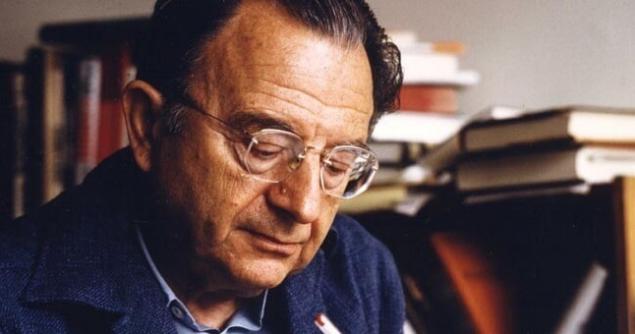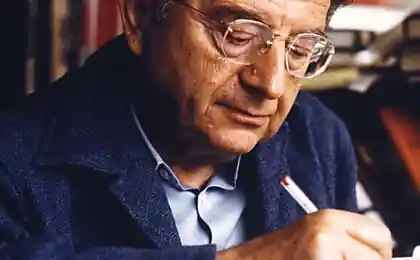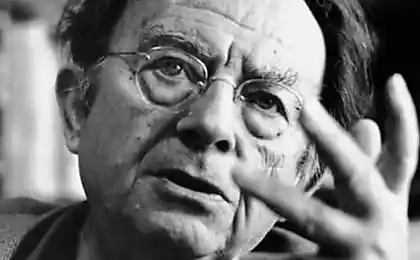819
Erich Fromm: If you ask people what a paradise, they will say that this is a big supermarket
We publish an archival record an interview with Erich Fromm, in which the German psychologist talks about the society of the XX century diseases, personality problems it faces in the consumer era, the relationship of people to each other, the true values and the dangers that await us in the era of wars and government manipulation.
In 1958, a popular journalist and TV anchor Mike Wallace invited in the program «The Mike Wallace Interview» well-known psychiatrist, sociologist and philosopher Erich Fromm XX century to talk about contemporary American society.
And this conversation, of course, took place. However, what Fromm spoke of a single society of the country in 1958, it became a kind of diagnosis, which equally can be applied to dozens of other countries and societies - perhaps to the entire era as a whole. And Russia in this regard is no exception. With the only difference being that the processes that have been discussed in an interview with Erich Fromm in the 50s, began in our country much later -. And now we are seeing them rastset
. So what I mean? A journalist and a psychiatrist discuss the relationship between society and man, and Erich Fromm consistently explains what happens to a person in a state that considers man only as a cog in a vast mechanism of "production-consumption».

As people are impaired and are forced to sell their personalities, and then turn into things - unwanted and unclaimed? Why lose interest and even hate her? Why do we give up responsibility for what happens in society (the policies are safely in their own interests)?
What happens to the States, the main purpose of which becomes "survival"? The "market orientation" threatens the individual? What is a "healthy society"? What is true happiness? What is the difference, "equality" and "sameness"? And because of this, we actually close? Listen Fromm.
On the relation of man to the consumer society:
Mike Wallace: I would like to know your opinion as an analyst, what happens to us as individuals. For example, what would you say about what happens to a man, an American, in relation to his work?
Erich Fromm: I think his work is largely meaningless for him, because he does not have any relation to it. He becomes part of a larger mechanism - the social mechanism, managed by bureaucracy. And I think that the Americans are very often unconsciously hates his job, because he feels trapped, imprisoned. He feels that he spends most of his life, his energy on something that has no meaning for him.
Mike Wallace: For him, it makes sense. He uses his work to make a living, so it's a decent, reasonable and necessary.
Erich Fromm: Yes, but this is not enough to make a person happy if he spends eight hours a day, doing what does not make sense, and interest, in addition to making money for him
. Mike Wallace: That makes sense. This is interesting work. Maybe I'm too pushy, but what exactly do you mean? When a person works in a factory, for example, an adjustable wrench, which can be in this deep meaning?
Erich Fromm: There is a creative delight, which was among the artisans of the Middle Ages and still remains in countries such as Mexico. It is the pleasure of creating something specific. You will find very few skilled workers who have been getting this pleasure. Maybe it is familiar to the worker in a steel mill may be an employee whose work involves the use of complex machines - he feels that creates something. But if you take a seller who sells a product without the use of, it feels a fraud, and he hates the goods as ... something ...
Mike Wallace: But you are talking about useless products. And if he sells toothbrushes, cars, televisions, or ...
Erich Fromm: "Useless" - a relative term. For example, to make a plan, the seller has to get people to buy them, knowing that they should not buy them. Then, from the perspective of the needs of these people, they are useless, even if on their own things in order.
What is a "market orientation" and to which it leads:
Mike Wallace: In your work you often talk about "market orientation". What do you mean by "market-oriented", Dr. Fromm?
Erich Fromm: I mean that the main way of relationships between people of the same way people relate to things in the market. We want to change the self or, as is sometimes said, "our personal baggage" at something. Now this does not apply to physical labor. manual workers shall not sell my personality.
He does not sell his smile. But those whom we call "white collar", that is, all the people who deal with numbers, to paper, to people who manipulate - use a better word - manipulates people, characters and words. Today, they not only have to sell their services, but by entering into a transaction, they have more or less to sell and their identity. Of course, there are exceptions.
Mike Wallace: So, their sense of self-worth should depend on how much the market is willing to pay for them ...
Erich Fromm: Exactly! Just as bags that can not be sold, because there is sufficient demand. From an economic point of view, they are useless. And if the bag could feel this would be a terrible feeling of inferiority, because nobody has bought, which means that it is useless. Similarly, a person who considers himself a thing. And if he is not successful enough to sell himself, he feels that his life is a failure.
On responsibility:
Erich Fromm: ... We have given the responsibility for what happens in our country, experts who should take care of her. Private citizen does not feel that he can have his own opinion. And even then, that he should do it, and be responsible for it. I think a number of recent events proves it.
Mike Wallace: ... When you talk about the need to do something about it, maybe the problem is that in our society amorphous very difficult to develop this feeling. Everyone wanted to do something, but it is very difficult to develop a sense of responsibility.
Erich Fromm: I think here you point to one of the major shortcomings of our system. The citizen has very little chance to exert any influence - to express their views in decision-making. And I think that this in itself leads to political lethargy and stupidity. It is true that it is necessary to think first and then act. But it is also true that if a person is unable to act, his mind goes blank and stupid.
About values, equality and happiness:
Mike Wallace: Painting Society you draw - we are talking now primarily about the western society, about American society - the picture that you are painting a very grim. Of course, our main task in this part of the world - is to survive, and remain free to realize themselves. As everything that you said, affects our ability to survive and remain free in this world, which is currently in crisis?
Erich Fromm: I think you just touched on a very important issue: we must decide tsenostey ... If our highest value is the development of the Western tradition - a man for whom the most important is a person's life, for whom love, respect and dignity are the supreme values, we can not say: "If it is better for our survival, we could leave these values»
. If this is the highest value, then we are alive or not, we will not change them. But if we begin to say, "Well, maybe we will be able to better cope with the Russian, if also transformed himself into a controlled society, if we, as someone suggested the other day, we train our soldiers to be like the Turks, who so bravely fought in Korea ... ". If we want to change our whole way of life for the sake of so-called "survival", then I think we are doing exactly what threatens our survival.
Because our vitality and viability of every nation is based on sincerity and depth of faith in the idea that it declares. I think we're in danger, because we say one thing and feel and act differently.
Mike Wallace: What do you mean
? Erich Fromm: I mean, we're talking about equality, about happiness, about freedom and spiritual values of religion, about God, and in our daily lives we operate according to the principles that are different and partly contradict these ideas
<. br> Mike Wallace: Okay, I want to ask you about what you mentioned: equality, happiness and freedom
. Erich Fromm: Well, I'll try. On the one hand, equality can be understood in the sense that there is in the Bible that we are all equal, because we are created in God's image. Or, if you do not use the theological language: that we are all equal in the sense that no one person should not be a means for the other person, but each person is an end in itself. Today we talk a lot about equality, but I think most people understand by this similarity. They are all the same - and they are afraid if they do not like each other, they are not equal
. Mike Wallace: And happiness
. Erich Fromm: Happiness - is very proud of the floor of our cultural heritage. I think if you ask today, what people actually think of happiness, it will be unlimited consumption - such things Mr. Huxley described the "Brave New World" in his novel. I think if you ask people what is paradise, and if they are honest, they would say that it is kind of a big supermarket with new things every week, and enough money to buy everything new. I think today most people happiness is forever be an infant: drink more than this, that or the other
. Mike Wallace: And what should be the happiness
? Erich Fromm: Happiness should be the result of creative, original, deep relationships - understanding and responsiveness to everything in life - to people, to nature. Happiness does not exclude sadness - if a person reacts to life, it is sometimes happy and sometimes he is sad. It depends on what he reacts.
In 1958, a popular journalist and TV anchor Mike Wallace invited in the program «The Mike Wallace Interview» well-known psychiatrist, sociologist and philosopher Erich Fromm XX century to talk about contemporary American society.
And this conversation, of course, took place. However, what Fromm spoke of a single society of the country in 1958, it became a kind of diagnosis, which equally can be applied to dozens of other countries and societies - perhaps to the entire era as a whole. And Russia in this regard is no exception. With the only difference being that the processes that have been discussed in an interview with Erich Fromm in the 50s, began in our country much later -. And now we are seeing them rastset
. So what I mean? A journalist and a psychiatrist discuss the relationship between society and man, and Erich Fromm consistently explains what happens to a person in a state that considers man only as a cog in a vast mechanism of "production-consumption».

As people are impaired and are forced to sell their personalities, and then turn into things - unwanted and unclaimed? Why lose interest and even hate her? Why do we give up responsibility for what happens in society (the policies are safely in their own interests)?
What happens to the States, the main purpose of which becomes "survival"? The "market orientation" threatens the individual? What is a "healthy society"? What is true happiness? What is the difference, "equality" and "sameness"? And because of this, we actually close? Listen Fromm.
On the relation of man to the consumer society:
Mike Wallace: I would like to know your opinion as an analyst, what happens to us as individuals. For example, what would you say about what happens to a man, an American, in relation to his work?
Erich Fromm: I think his work is largely meaningless for him, because he does not have any relation to it. He becomes part of a larger mechanism - the social mechanism, managed by bureaucracy. And I think that the Americans are very often unconsciously hates his job, because he feels trapped, imprisoned. He feels that he spends most of his life, his energy on something that has no meaning for him.
Mike Wallace: For him, it makes sense. He uses his work to make a living, so it's a decent, reasonable and necessary.
Erich Fromm: Yes, but this is not enough to make a person happy if he spends eight hours a day, doing what does not make sense, and interest, in addition to making money for him
. Mike Wallace: That makes sense. This is interesting work. Maybe I'm too pushy, but what exactly do you mean? When a person works in a factory, for example, an adjustable wrench, which can be in this deep meaning?
Erich Fromm: There is a creative delight, which was among the artisans of the Middle Ages and still remains in countries such as Mexico. It is the pleasure of creating something specific. You will find very few skilled workers who have been getting this pleasure. Maybe it is familiar to the worker in a steel mill may be an employee whose work involves the use of complex machines - he feels that creates something. But if you take a seller who sells a product without the use of, it feels a fraud, and he hates the goods as ... something ...
Mike Wallace: But you are talking about useless products. And if he sells toothbrushes, cars, televisions, or ...
Erich Fromm: "Useless" - a relative term. For example, to make a plan, the seller has to get people to buy them, knowing that they should not buy them. Then, from the perspective of the needs of these people, they are useless, even if on their own things in order.
What is a "market orientation" and to which it leads:
Mike Wallace: In your work you often talk about "market orientation". What do you mean by "market-oriented", Dr. Fromm?
Erich Fromm: I mean that the main way of relationships between people of the same way people relate to things in the market. We want to change the self or, as is sometimes said, "our personal baggage" at something. Now this does not apply to physical labor. manual workers shall not sell my personality.
He does not sell his smile. But those whom we call "white collar", that is, all the people who deal with numbers, to paper, to people who manipulate - use a better word - manipulates people, characters and words. Today, they not only have to sell their services, but by entering into a transaction, they have more or less to sell and their identity. Of course, there are exceptions.
Mike Wallace: So, their sense of self-worth should depend on how much the market is willing to pay for them ...
Erich Fromm: Exactly! Just as bags that can not be sold, because there is sufficient demand. From an economic point of view, they are useless. And if the bag could feel this would be a terrible feeling of inferiority, because nobody has bought, which means that it is useless. Similarly, a person who considers himself a thing. And if he is not successful enough to sell himself, he feels that his life is a failure.
On responsibility:
Erich Fromm: ... We have given the responsibility for what happens in our country, experts who should take care of her. Private citizen does not feel that he can have his own opinion. And even then, that he should do it, and be responsible for it. I think a number of recent events proves it.
Mike Wallace: ... When you talk about the need to do something about it, maybe the problem is that in our society amorphous very difficult to develop this feeling. Everyone wanted to do something, but it is very difficult to develop a sense of responsibility.
Erich Fromm: I think here you point to one of the major shortcomings of our system. The citizen has very little chance to exert any influence - to express their views in decision-making. And I think that this in itself leads to political lethargy and stupidity. It is true that it is necessary to think first and then act. But it is also true that if a person is unable to act, his mind goes blank and stupid.
About values, equality and happiness:
Mike Wallace: Painting Society you draw - we are talking now primarily about the western society, about American society - the picture that you are painting a very grim. Of course, our main task in this part of the world - is to survive, and remain free to realize themselves. As everything that you said, affects our ability to survive and remain free in this world, which is currently in crisis?
Erich Fromm: I think you just touched on a very important issue: we must decide tsenostey ... If our highest value is the development of the Western tradition - a man for whom the most important is a person's life, for whom love, respect and dignity are the supreme values, we can not say: "If it is better for our survival, we could leave these values»
. If this is the highest value, then we are alive or not, we will not change them. But if we begin to say, "Well, maybe we will be able to better cope with the Russian, if also transformed himself into a controlled society, if we, as someone suggested the other day, we train our soldiers to be like the Turks, who so bravely fought in Korea ... ". If we want to change our whole way of life for the sake of so-called "survival", then I think we are doing exactly what threatens our survival.
Because our vitality and viability of every nation is based on sincerity and depth of faith in the idea that it declares. I think we're in danger, because we say one thing and feel and act differently.
Mike Wallace: What do you mean
? Erich Fromm: I mean, we're talking about equality, about happiness, about freedom and spiritual values of religion, about God, and in our daily lives we operate according to the principles that are different and partly contradict these ideas
<. br> Mike Wallace: Okay, I want to ask you about what you mentioned: equality, happiness and freedom
. Erich Fromm: Well, I'll try. On the one hand, equality can be understood in the sense that there is in the Bible that we are all equal, because we are created in God's image. Or, if you do not use the theological language: that we are all equal in the sense that no one person should not be a means for the other person, but each person is an end in itself. Today we talk a lot about equality, but I think most people understand by this similarity. They are all the same - and they are afraid if they do not like each other, they are not equal
. Mike Wallace: And happiness
. Erich Fromm: Happiness - is very proud of the floor of our cultural heritage. I think if you ask today, what people actually think of happiness, it will be unlimited consumption - such things Mr. Huxley described the "Brave New World" in his novel. I think if you ask people what is paradise, and if they are honest, they would say that it is kind of a big supermarket with new things every week, and enough money to buy everything new. I think today most people happiness is forever be an infant: drink more than this, that or the other
. Mike Wallace: And what should be the happiness
? Erich Fromm: Happiness should be the result of creative, original, deep relationships - understanding and responsiveness to everything in life - to people, to nature. Happiness does not exclude sadness - if a person reacts to life, it is sometimes happy and sometimes he is sad. It depends on what he reacts.























